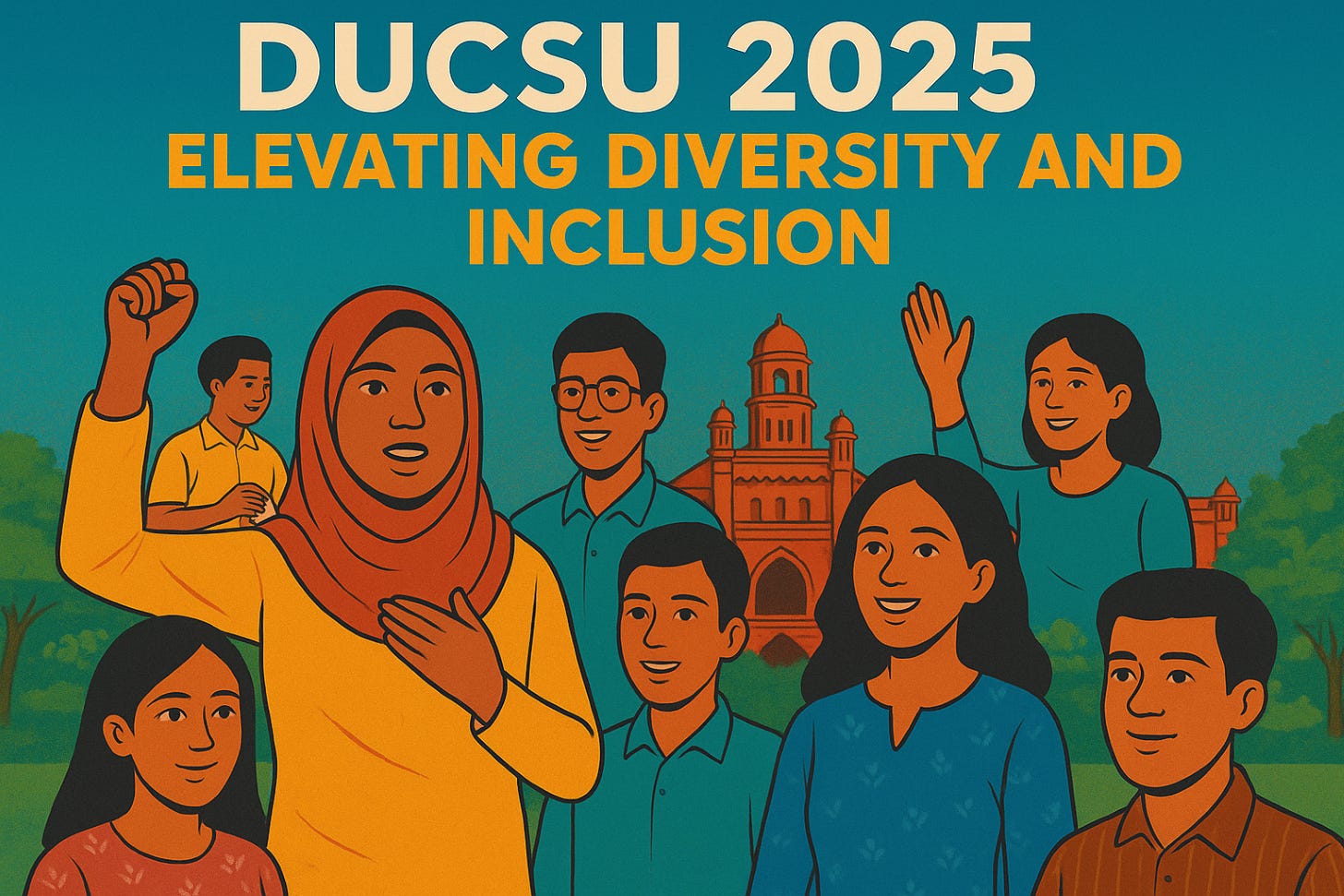DUCSU 2025: Diversity and Inclusion Take Center Stage in Panels
DUCSU 2025 highlights women, minorities, and differently-abled candidates, with rare unity for injured activists, marking a historic step toward inclusive student politics.
জুলাই গণঅভ্যুত্থান-পরবর্তী প্রথম ডাকসু নির্বাচন শুধু ক্যাম্পাস নয়, জাতীয় রাজনীতিতেও এক গুরুত্বপূর্ণ মাইলফলক। এবারের প্রার্থী মনোনয়নে বৈচিত্র্য ও অন্তর্ভুক্তিকে বিশেষ গুরুত্ব দেওয়া হয়েছে। নারী শিক্ষার্থী, জাতিগত সংখ্যালঘু এবং ভিন্নভাবে সক্ষম প্রার্থীদের অংশগ্রহণ ২০২৪ সালের আন্দোলনে উত্থাপিত গণতান্ত্রিক আদর্শের বাস্তব প্রতিফলন। আহত কর্মীদের প্রতি আন্তঃপ্যানেল সংহতি এবং বৃহত্তর প্রতিনিধিত্ব ঢাবির ক্রমবর্ধমান ভূমিকা তুলে ধরে—যা ভবিষ্যতের জাতীয় রাজনীতিতে অন্তর্ভুক্তিমূলক নেতৃত্ব গঠনের নতুন দিগন্ত উন্মোচন করছে।
Dhaka University is set to hold its long-awaited Central Students’ Union (DUCSU) election on 9 September 2025, the first since 2019. This year’s election is significant not only as a contest for leadership but also for the focus panels have placed on diversity and inclusion. Women, ethnic minority students, and differently-abled candidates have been nominated for key positions, while an independent candidate injured during the uprising has received cross-panel support. This report examines how the 2025 DUCSU election reflects the panels’ efforts to bring a wider range of voices into student politics, especially after the historic July Uprising.
Women at the Forefront
The women played a pivotal role in the July Uprising 2024. As a result, women’s representation has taken a visible turn in the DUCSU election 2025. “Protirodh Porshod”, a coalition of seven left-leaning student groups, has nominated eleven female candidates, including Sheikh Tasnim Afroz Emi for Vice President (VP) and Nuzia Hasin for Common Room and Cafeteria. Islami Chhatra Shibir, long known as a religion-based student organization, has also nominated four female students, including Umme Salma for Common Room and Cafeteria while Fatema Tasnim Juma for Liberation War and Democratic Movement in their panel named “Oikkoboddho Shikkharthi Jot”. In addition, Sabikun Nahar Tamanna and Afsana Akter have been nominated for member posts.
Bangladesh Ganatantrik Chhatra Sangsad's panel “Boishommobirodhi Shikkharthi Sangsad” nominated Ashrefa Khatun for Assistant General Secretary (AGS) while Mitu Akhter for Common Room, Reading Room, and Cafeteria and Anika Tahsina for Human Rights and Law.
Bangladesh Jatiyatabadi Chhatra Dal (JCD) nominated Chamon Fariya Islam Meghla for Common Room and Cafeteria, while Chhatra Adhikar Parishad's “DUCSU for Change” panel nominated Sabina Yasmin for General Secretary (GS). Together, these candidacies show that women are no longer on the sidelines of student politics.
Independent groups have also given women key roles. In Shwatantra Shikkharthi Oikko, Umama Fatema, a former spokesperson of Students Against Discrimination, is running for Vice President, while Israt Jahan Nijhum and Nusrat Jahan Nishu are nominated for Health and Environment and Human Rights. Shamonnito Shikkharthi Sangsad nominated Fateha Sharmin Anne as Assistant General Secretary and several others for important posts.
Ethnic Minorities Find a Voice
Ethnic minority inclusion has also gained momentum. Protirodh Porshod has three ethnic minority candidates in its panel including the Career Development post, while Shwatantra Shikkharthi Oikko nominated Surmi Chakma for Common Room and Cafeteria and Rupaiya Shrestha Tanchangya for Career Development.
Chhatra Dal nominated Chim Chimya Chakma for Sports Secretary, giving him a prominent place in its slate while Chhatra Shibir nominated Sorbo Mitra Chakma as one of its member candidates.
Students with Disabilities Step Forward
Differently-abled students are also visibly present in this year’s DUCSU elections. Chhatra Shibir nominated Raisul Islam, a visually impaired student, as a member candidate. Chhatra Dal nominated Ibnu Ahmed, also visually impaired, to contest for a member post. The participation of these students reflects the growing idea that disability inclusion is part of a true democratic practice on campus.
Shared Solidarity Across Panels
One of the most striking elements of the 2025 race is the cross-panel solidarity with Sanjida Ahmed Tanney. Injured during the July Uprising of 2024, Tanney is running independently for Research and Publications Secretary. In her support, several panels—including Chhatra Dal, Bangladesh Ganatantrik Chhatra Sangsad, Islami Chhatra Andolan, and left-leaning alliances—have left the position vacant. This decision marks a rare moment of unity across political divides. Shibir has also highlighted sacrifices in its panel by nominating Khan Jasim, who lost an eye during the uprising, for International Affairs Secretary.
A Broader Picture of Representation
From female representation to ethnic minority and differently-abled voices, the DUCSU 2025 elections show a much broader attempt to reflect the university’s diverse student body. Panels are focusing on social inclusion, even if it may also serve as a political strategy. The range of names suggests that this election is not only about leadership but also about recognition.
Eventually, the outcome of the DUCSU 2025 election will determine who leads the historic student union, but the election itself has already shown a marked shift toward broader representation. By nominating female, ethnic minority, and differently-abled students and supporting independent candidates injured during the July Uprising panels have acknowledged the importance of inclusion on campus. DUCSU this time clearly demonstrates that diversity and representation are central to the election campaign, reflecting the evolving landscape of student politics after the fall of Sheikh Hasina’s authoritarian regime.
About the Author:
Mohammed Raihan is a staff contributor to the Insighta. He writes on history, culture, language, economy and geopolitics, uncovering untold narratives that connect the past and present. He can be reached at mohammed_raihan@theinsighta.com
Disclaimer: The views expressed in this article are the author's own and do not necessarily reflect The Insighta's editorial stance. However, any errors in the stated facts or figures may be corrected if supported by verifiable evidence.




